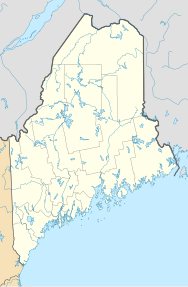Anson, Maine
| Anson, Maine | |
|---|---|
| Town | |

Looking across the falls at downtown Anson, showing the town hall at left.
|
|
| Location within the state of Maine | |
| Coordinates: 44°48′41″N 69°53′32″W / 44.81139°N 69.89222°W | |
| Country | United States |
| State | Maine |
| County | Somerset County |
| Area | |
| • Total | 48.29 sq mi (125.07 km2) |
| • Land | 47.49 sq mi (123.00 km2) |
| • Water | 0.80 sq mi (2.07 km2) |
| Population (2010) | |
| • Total | 2,511 |
| • Estimate (2012) | 2,499 |
| • Density | 52.9/sq mi (20.4/km2) |
| Time zone | Eastern (EST) (UTC-5) |
| • Summer (DST) | EDT (UTC-4) |
Anson is a town in Somerset County, Maine, United States. The population was 2,511 at the 2010 census. It includes the villages of Anson and North Anson.
This was once territory of the Norridgewock Abenaki Indians. It was first settled in 1772 as Plantation Number One in what would become Somerset County on March 1, 1809. General Benedict Arnold and his troops passed through Anson village in 1775 on their way up the Kennebec River to the ill-fated Battle of Quebec. The town was incorporated on March 1, 1798 as Anson, named after Lord George Anson. On March 20, 1845, North Anson was set off as a separate town, although on March 13, 1855, it reunited with Anson.
With much rich alluvial soil, Anson became an agricultural town. Water power sites around the Carrabassett River helped North Anson develop into a small mill town. In 1859, it had two tanneries. It had two sawmills and three boot and shoe factories in 1886, when the town produced boots, shoes, leather, bricks, lumber, flour and wool rolls. By 1876, North Anson was the northern terminus of the Somerset Railroad, which began at Oakland in 1872. As Madison grew into an industrial center with large paper mills, Anson became a residential district for its mill workers.
...
Wikipedia

